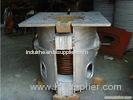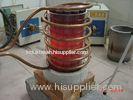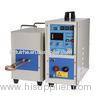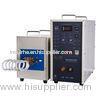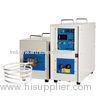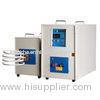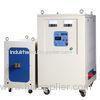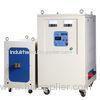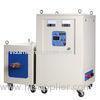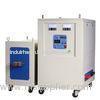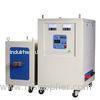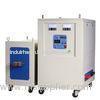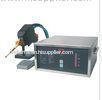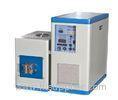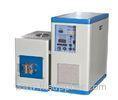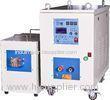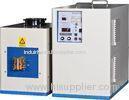|
Guang Yuan Technology (HK) Electronics Company
|
induction hardening machinery high frequency induction hardening
| Place of Origin: | Zhejiang, China (Mainland) |
|
|
|
| Add to My Favorites | |
| HiSupplier Escrow |
Product Detail
Quenching Machine Induction Hardening Machine For Steel Quenching
<span
Quenching Machine Induction Hardening Machine For Steel Quenching
Quick Detail:
|
Name |
Quenching Machine Induction Hardening Machine For Steel Quenching |
Application |
Quenching |
|
Net weight |
900kg |
Cooling method |
immersion, hydrojet |
|
Dimension |
1100*900*2000 |
Certificate |
CE,SGS |
Major features
Machine tool adopting immersion and spray cooling means is sued in combination with high and intermediate frequency induction equipments, which is applicable to the heating and tempering for such work pieces as shafts, gears, discs and rods. This machine belongs to the semi-automatic induction heater adopting hydraulic drive and electrical control, which has manual, inching and automatic functions as required by precise positioning and easy operation
Technical Parameters
The maximum diameter of quenching material: 300mm
The maximum weight of the work piece: 50kg
Work piece operating speed:1-30mm/s
Work piece descent speed: 120mm/s
Speed of main shaft:1-200r/min
Motor power of main drive: 1.5kw
Cooling method: immersion, hydrojet
Machine Weight: 900kg
Dimension: 1100*900*2000
Transmission mode: mechanical rotation
Operating Principle
Frequency conversion electromagnetic induction heating or induction heating for short is a method for heating metal materials by converting power frequency power supply into that of specific range based on the principle of electromagnetic induction. It is mainly applicable to the metal hot working, heat treatment, welding and melting. This type of heating technique is also applicable to packing industry (such as sealing of aluminum foil used in medicine and food industry), semiconductor material (such as extruded monocrystalline silicon and heated affixing metal parts for auto glass).
Basic components of induction heating system include induction coil, AC power source and work pieces. Induction coil can be fabricated into different shapes as per different heated objects. The coil is connected with the power source providing alternating current for coil. The alternating current possessed by the coil can create a alternating magnetic field passing through the work pieces to produce eddy flow as required by heating.
Advantages of Induction Heating Equipment
1. Fast heating: the minimum rate of heating is less than 1 second (rate of heating is available for adjustment and control).
2. Wide coverage of heating: it can be used to heat various metal parts (replace removable induction coil as per different operating switches).
3. Easy installation: it can be used once it is connected with power source, induction coil as well as water supply pipe and rising pipe; it is small in size and light in weight.
4. Easy operation: you can learn to operate it within several minutes.
5. Fast start-up: it can be started to perform heating operation on condition that water and power supply is available.
6. Low power consumption: As compared with conventional vacuum tube high frequency equipments, it can save the power by approximately 70%. The smaller the size of the work piece is, the lower power consumption would be.
7. High effectiveness: it has such features as uniform heating (it is applicable to adjust the spacing of the induction coil to ensure the appropriate temperature as required by each part of work piece), fast warming and limited oxic horizon, and can guard against any waste after annealing.
8. Comprehensive protection: it has such functions as overpressure, over-current, overheat and water shortage alarm indications as well as automatic control and protection.
9. Controllable temperature: it is applicable to control the temperature for heating work pieces as per the preset heating time, and thereby control the heating temperature at a certain technical point.
10. Comprehensive full load design: it can work continuously for 24 hours.
11. Small size and light weight: it has a weight of only several dozens of kilograms, of which, the limited floor space can effectively save the workshop space.
12. Elimination of high voltage: it requires no step-up transformer which may produce approximately ten thousand voltage, and thus can ensure the maximum safety.















